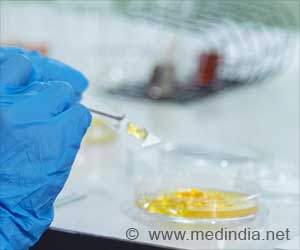Recent studies on mice suggest that cancer medication could have the potential to target the protein link that triggers Parkinson's disease.

New Study Suggests Cancer Drug Could Be Used to Target Protein Connection That Spurs Parkinson's Disease
Go to source).
‘Approximately one million individuals in the United States and 10 million individuals globally are currently living with Parkinson’s disease. #neurodegenerativedisorder #parkinson’sdisease #medindia’





The researchers emphasize that Lag3 is currently the focus of a combination cancer medication approved by the U.S. Food and Drug Administration (FDA). This drug uses antibodies to educate the human immune system on identifying and eliminating specific targets.The associate professor of neurology at the Johns Hopkins University School of Medicine and a member of the Institute for Cell Engineering, Xiaobo Mao, Ph.D., states, “Now that we know how Aplp1 and Lag3 interact, we have a new way of understanding how alpha-synuclein contributes to the disease progression of Parkinson’s disease,”.
Mao further added, “Our findings also suggest that targeting this interaction with drugs could significantly slow the progression of Parkinson’s disease and other neurodegenerative diseases.”
The research study was a collaboration of Mao with Ted Dawson, M.D., Ph.D., who holds the Leonard and Madlyn Abramson Professorship in Neurodegenerative Diseases at the Johns Hopkins University School of Medicine and serves as the director of the Johns Hopkins Institute for Cell Engineering. In addition, Valina Dawson, Ph.D., and Hanseok Ko, Ph.D., both professors of neurology at the School of Medicine and affiliated with the Institute for Cell Engineering, also contributed to the research (2✔ ✔Trusted Source
Aplp1 interacts with Lag3 to facilitate transmission of pathologic α-synuclein
Go to source).
A number of extensive studies have consistently demonstrated that misfolded alpha-synuclein proteins can aggregate and create protein deposits. These proteins then travel from one brain cell to another, resulting in the death of the cells responsible for producing dopamine, a crucial neurotransmitter. This phenomenon, which has been identified by Johns Hopkins researchers, leads to the progression of Parkinson's disease through a form of "programmed" cell death. This process, referred to as parthanatos, derived from the Greek word for "death," ultimately leads to impairments in movement, emotional regulation, and cognitive function.
Advertisement
In the studies conducted on mice in 2016 and 2021, the team led by Mao and Dawson discovered the involvement of Lag3 in the binding process with alpha-synuclein proteins, which leads to the progression of Parkinson's disease. Nevertheless, these studies also revealed that another protein played a partial role in the cell's uptake of misfolded alpha-synuclein.
Advertisement
In order to ascertain the role of Aplp1 in the spread of detrimental alpha-synuclein proteins, researchers used mice that were genetically modified to lack either Aplp1 or Lag3, or both Aplp1 and Lag3. The absence of Aplp1 and Lag3 in mice resulted in a significant reduction of 90% in the uptake of harmful alpha-synuclein protein by cells. Subsequently, when mice were administered the Lag3 antibody, it was observed that this medication also hindered the interaction between Aplp1 and Lag3. As a result, healthy brain cells were no longer capable of absorbing the clumps of alpha-synuclein that cause disease.
The scientists suggest that the Lag3 antibody nivolumab/relatlimab, an FDA-approved medication for cancer therapy in 2022, may have the potential to hinder the absorption of alpha-synuclein by cells.
Ted Dawson states, “The anti-Lag3 antibody was successful in preventing further spread of alpha-synuclein seeds in the mouse models and exhibited better efficacy than Lag3-depletion because of Aplp1’s close association with Lag3,”.
Mao stated that this study has a strong possibility for treating other neurodegenerative disorders lacking effective treatments. In the case of Alzheimers disease, characterized by memory loss, mood swings, and muscle issues, tau proteins undergo misfolding and aggregation within neurons, aggravating the disease. Mao suggests that in Alzheimer's research, scientists could investigate the possibility of utilizing the same antibody to target Lag3, the protein which also binds with the tau protein associated with dementia.
After the successful utilization of the Lag3 antibody in mice, Ted Dawson has expressed his intention to proceed with anti-Lag3 antibody trials in mice with Parkinson's disease and Alzheimer's disease. As a preventive measure, the researchers at Johns Hopkins are also exploring ways to prevent the diseased cells from releasing alpha-synuclein, which is responsible for causing the disease.
References:
- New Study Suggests Cancer Drug Could Be Used to Target Protein Connection That Spurs Parkinson's Disease - (https://www.hopkinsmedicine.org/news/newsroom/news-releases/2024/06/new-study-suggests-cancer-drug-could-be-used-to-target-protein-connection-that-spurs-parkinsons-disease)
- Aplp1 interacts with Lag3 to facilitate transmission of pathologic α-synuclein - (https://www.nature.com/articles/s41467-024-49016-3)
Source-Medindia















